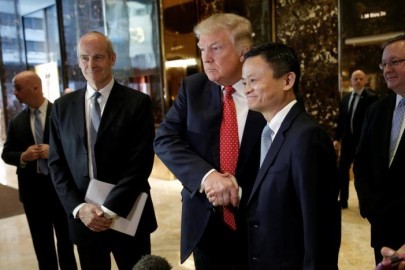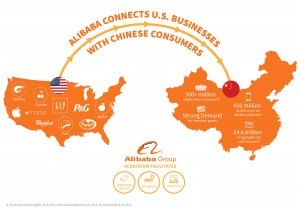President-elect Donald Trump said he had a “great meeting” with Alibaba executive chairman Jack Ma on Monday, when they discussed 1 million new U.S. jobs.
Ma said that Alibaba’s expansion would focus on products like garments, wine and fruits, with a special focus on trade between the American midwest and southeast Asia.
“We’re focused on small business,” Ma told reporters. “We specifically talked about … supporting 1 million small businesses, especially in the Midwest of America. Small businesses on the platform selling products — agriculture products and America services — to China and Asia, because we’re pretty big in Asia.”
Where those jobs would come from is unclear. While an Alibaba spokesperson told CNBC before the meeting that the Chinese online retail giant company would create 1 million jobs over five years, Ma’s comments focused on supporting small businesses.
“Alibaba will create 1 million U.S. jobs by enabling 1 million American small businesses and farmers to sell American goods to China and Asian consumers on the Alibaba platform,” the company said in a statement.
Like Etsy or eBay, Alibaba enables third-party sellers in China to take their own businesses to the web. The company only had 36,446 full-time employees, almost all in China, as of March 31, according to SEC filings. But with more than 10 million active sellers as of 2015, Alibaba estimates its China retail marketplaces “contributed to the creation of over 15 million job opportunities.”
Amazon, by comparison, had about 230,800 employees as of the end of 2015, though it, too, creates other jobs through its sellers, contractors and supporting services. Wal-Mart, which is strengthening its online presence, employs 2.3 million associates around the world, including 1.5 million in the U.S., as of the end of fiscal 2016.
Monday’s meeting was planned to focus on the Chinese e-commerce company’s U.S. expansion plans, according to spokespeople for both Alibaba and Trump. Ma had planned to be in New York on Monday and the scheduling worked out for the meeting at Trump Tower, a source told CNBC.
“We had a great meeting, and a great, great entrepreneur, one of the best in the world, and he loves this country, and he loves China,” Trump said. “Jack and I are going to do some great things.”
Shares of Alibaba’s stock rose 1 percent on Monday.
The meeting came amid tensions between China and the incoming Trump administration. Trump has proposed steep tariffs on Chinese goods and has ired China over the U.S. relationship with Taiwan. Ma said that going through the business community will help the U.S. and China understand their political situation better.
“We also think that the China and USA relationship should be strengthened — should be more friendly,” Ma said. “The door is open … [for] discussing the relationship and trade issues. I think the president-elect is very smart, he’s very open-minded to listen. I told him my ideas about how to improve trade, especially to improve small business, cross border trade. … [Trump] has concerns, and he has solutions, that he wants to discuss with China and us.”
EMarketer estimates that there will be more than $150 billion in cross-border e-commerce sales in China by 2020.
If an expansion is announced, Alibaba would be the latest in a string of companies to commit to create U.S. jobs in the wake of Trump’s election. Japanese tech giant Softbank, whose CEO Masayoshi Son is on Alibaba’s board, has reiterated a commitment to create 50,000 U.S. jobs after meeting with Trump.
It’s unclear if the two announcements are related. CNBC has reached out to Softbank for comment.
Trump has also been critical of of Alibaba’s rival, Amazon. Trump has said Amazon will have “such problems” during his presidency, because of the tax structure.
Ma told CNBC last year that he wasn’t worried about anti-China sentiment on the presidential campaign trail.
“Somebody has to stand up and say, ‘Hey, we should not be anti-trade,'” he said.
Alibaba’s wide-ranging set of international businesses, from financial services to e-commerce to logistics, has managed to dominate many of America’s tech companies in China.
“I believe that … foreign technology companies will be successful in China,” Michael Evans, president of Alibaba Group, said at Vanity Fair’s 2016 New Establishment Summit in San Francisco in the fall. “I also believe that Chinese technology companies, including Didi, probably Alibaba, will be successful in the U.S. and Europe. But that is the challenge and the most difficult parts of globalization for us.”
Evans, who knows Trump personally, may have brokered Monday’s meeting with Trump, a source told CNBC.
Still, Alibaba has a complicated relationship with U.S. regulators. The company faced an SEC investigation about its accounting methods last year, and its property, Taobao, has been rebuked by American trade officials for allowing sale of counterfeit goods.
Ask me anything
Explore related questions






